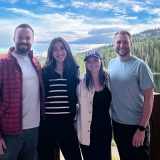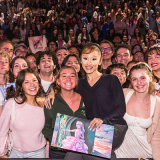Six Lessons from Salute Your Shorts
February 12, 2016
EDITOR’S NOTE: On Wednesday, we held the first of our new Dodge Industry Dialogues panel series, entitled Salute Your Shorts, where film festival programmers dished on what they look for and what not to do when submitting. Programmers from the Los Angeles Film Festival, Palm Springs International Film Festival, Sundance, and more gave some tips to the students in attendance. Kevin Harman, our Festival and Industry Relations Specialist, was kind enough to write up six of the major lessons that our guests touched upon.
“The shorter the better” – Jennifer Wilson from Los Angeles Film Festival.
Every programmer on the panel agreed that films are infinitely more likely to be considered if they are 15 minutes or shorter. Dilcia Barrera from Sundance said that there were only 6 short films in this year’s festival that were longer than 20 minutes. Riki Kucheck from Newport Beach Film Festival said she could count the number of films that they’ve programmed over 30 minutes on one hand (in her 14 years at the fest). Liliana Rodriguez of Palm Springs International ShortFest agreed that though they’ll consider longer lengths, 15 minutes was the sweet spot for shorts. Jennifer Wilson, Dodge alum, mentioned her filmmaker friend who made a great two minute film that played hundreds of great festivals because it was good – but also because it was only two minutes and easy to program.
“Watch other short films we’ve played” – Brian Hu from San Diego Asian Film Festival.
When asked how to gauge if your film is right for a given festival, the panel agreed again – look at what we’ve played in the past and look at your own film. Does it stack up, or is it similar to films that have played in a festival you’re interested in? Jennifer says to google shorts that played at festivals as many are online after their festival runs and look at film festival program guides that list print sources for films – you can ask for screeners politely and mostly get to watch these films that have been successful. Dilcia said to “do your research” and make sure you know the mission of the film festival you might be applying to. Does playing your film help them achieve what they’re going for?
“I will google you” – Dilcia Barrera from Sundance Film Festival.
The panel was confronted with a question I think many filmmakers wonder – do cover letters matter? There was some disagreement amongst the programmers here. Dilcia said if she likes the film and wants another reason to fight for it, she’ll look at the cover letter, but ultimately she’ll just seek your information out on her own. Brian said that he looks to the cover letter to see two things: location and ethnicity – are they San Diego locals and are they Asian? For niche festivals, eligibility and proximity are big. Lili and Riki both said they generally don’t look at cover letters and discourage pre-screeners from reading them. They want an honest, unbiased opinion of the film. If the film is a rough cut, however, they did say to mention this in the cover letter.
“Not another alarm clock, please” – Liliana Rodriguez from Palm Springs International ShortFest
Don’t do the same thing as everyone else. When asked what were common mistakes or faux pas they saw in short films were, the programmers cautioned against clichés and the same, tired storytelling. Brian said that many filmmakers think their take is original, but he sees dozens of similar films on the same topic, told in the same way. Watch other movies from your peers, other student films, and try to break out of the traditional mold of storytelling. Get to the bottom of what makes one film unique or a dime a dozen.
“Stills are very important” – Riki Kucheck from the Newport Beach Film Festival.
When asked about publicity and press kits, all programmers echoed the most important part: great stills. Jennifer said that it pays to have a good still photographer on set. Your stills should be eye-catching. “It’s a missed opportunity I see all the time,” Jennifer added, “you could be the face of your particular shorts program if only you sent me a nice, bright still.” Dilcia said in addition to good stills, get excited on social media. They want you to build excitement, tag them, and tag other filmmakers.
“Attend” – Everyone.
The moderator, Twitchfilm’s Ryland Aldrich, asked maybe the most pertinent question of the morning – what’s the most important thing I should I do after I get accepted? Attending a festival you’ve gotten into is a huge part of the process. “Build it into your budget” was a common addition amongst the panel. You won’t be able to attend every festival, but it’s a huge opportunity to network – even if you don’t get in. Dilcia said that attending Sundance or any festival is a great experience to see films and network, regardless of if you’re presenting a film. If you didn’t get in, go talk to the people who did and maybe you’ll be working on a film that’s playing the following festival. Riki added that you must have business cards – nobody’s going to want to jot down your number, but if you’re prepared, and can just hand them a card, you have a better shot of making an impression and connecting for the future.


